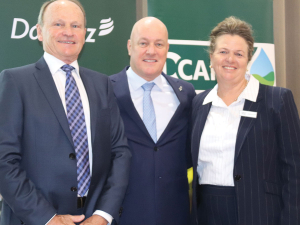DairyNZ Levy Vote Underway as Chair Highlights Seven-Fold Return
Voting has started for the renewal of DairyNZ's milksolids levy.
 Prime Minister Christopher Luxon flanked by DCANZ chair Guy Roper (left) and DairyNZ chair Tracy Brown at Parliament.
Prime Minister Christopher Luxon flanked by DCANZ chair Guy Roper (left) and DairyNZ chair Tracy Brown at Parliament.
There is nothing more important to New Zealand than agriculture, says Prime Minister Christopher Luxon.
He was speaking to 150 people at a special breakfast in the Beehive in Wellington this month to celebrate the success and importance of the dairy industry. The event was run jointly by DairyNZ and Dairy Companies Association of NZ (DCANZ) and guests included diplomats, politicians and business and industry leaders.
Luxon acknowledged the challenging trading times that farmers are going through, with a range of geopolitical events creating uncertainty. He also noted that NZ is in recovery mode and that it’s the dairy industry and agriculture in general that’s helping to turn the economy around.
The PM praised all those in the dairy sector who get up every day and go to work and do their best to generate income.
“I want them to know that they are not villains, rather they are deeply appreciated by this government for all that they do for NZ. Our farmers are the most efficient and productive farmers in the world, and we are proud of the sector,” he says.
Luxon says he’s staggered at the amount of ‘red tape’ that farmers must deal with and acknowledges the huge amount of stress this causes along with inflation and interest rates.
“Our aim is to create an environment that allows the dairy sector to thrive. This includes getting rid of red tape which is just simply regulation and not adding any value,” he says.
DairyNZ chair Tracy Brown says the event at parliament was to celebrate the progress the sector has made and to thank all those stakeholders who have contributed to this. She says it’s great to see the high degree of collaboration that exists in the sector and the way that this is benefiting farmers, the ag sector as a whole and the NZ economy.
“It was great to hear the Prime Minister talking up agriculture and the value of farming to the NZ economy,” she says.
Brown says over the last 15 years, huge progress has been made and positive actions taken to get some good environmental outcomes.
The recently appointed chair of DCANZ, Guy Roper, says as an exporting country NZ does very well. He says many parties contribute to this and the event at parliament was an opportunity to thank those who have played a part in the success of the sector.
“I think the dairy sector is well recognised for what it contributes to the NZ economy and what it does. But there is always more for us to do to develop the understanding of the contribution that it does make,” he told Dairy News.
Roper says, from a processor perspective, the innovation and products and understanding of what customers do is so important and he believes that the science and research that goes into that just makes it a success.
Global trade has been thrown into another bout of uncertainty following the overnight ruling by US Supreme Court, striking down President Donald Trump's decision to impose additional tariffs on trading partners.
Controls on the movement of fruit and vegetables in the Auckland suburb of Mt Roskill have been lifted.
Fonterra farmer shareholders and unit holders are in line for another payment in April.
Farmers are being encouraged to take a closer look at the refrigerants running inside their on-farm systems, as international and domestic pressure continues to build on high global warming potential (GWP) 400-series refrigerants.
As expected, Fonterra has lifted its 2025-26 forecast farmgate milk price mid-point to $9.50/kgMS.
Bovonic says a return on investment study has found its automated mastitis detection technology, QuadSense, is delivering financial, labour, and animal-health benefits on New Zealand dairy farms worth an estimated $29,547 per season.
OPINION: Staying with politics, with less than nine months to go before the general elections, there’s confusion in the Labour…
OPINION: Winston Peters' tirade against the free trade deal stitched with India may not be all political posturing by the…